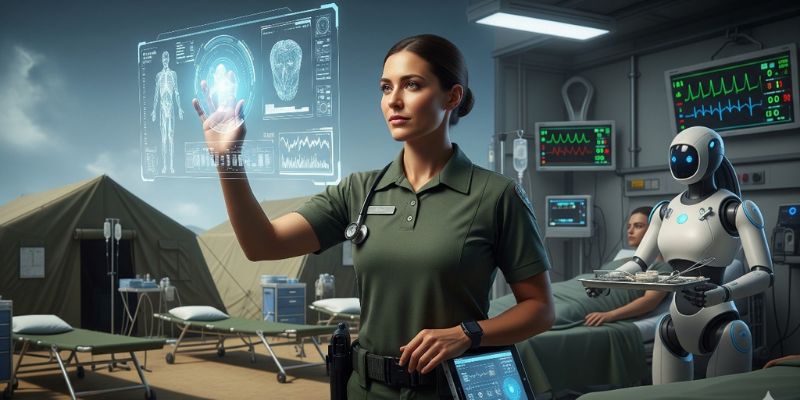Military nursing has long been an essential part of the healthcare industry, and it plays a critical role in the overall performance of the military forces. The role of military nursing has undergone significant transformation in recent years, as the military’s medical needs have become more complex and demanding. The future of military nursing service is likely to see further changes and enhancements, as the healthcare industry continues to evolve and adapt to new technologies and treatments. In this article, we will discuss the evolving role of military nursing and the factors that are likely to shape its future.
Factors Driving the Evolving Role of Military Nursing
There are several factors driving the evolving role of military nursing, including increasing demands for medical care, advances in medical technology and treatments, and expanding roles beyond traditional healthcare settings.
Increasing Demands for Medical Care
The military is facing increasing demands for medical care, especially in the wake of the COVID-19 pandemic. Military nurses are often called upon to provide critical care to soldiers and other military personnel who are injured or ill. This requires high skill and expertise, and military nurses must be prepared to work in challenging and stressful environments.
Advances in Medical Technology and Treatments Advances in medical technology and treatments are also driving changes in the role of military nursing. Military nurses must be trained in the latest medical techniques and procedures, and they must be able to operate complex medical equipment and technology. This requires ongoing education and training and a commitment to staying up-to-date with the latest developments in the healthcare industry.
Expanding Roles Beyond Traditional Healthcare Settings
The role of military nursing is expanding beyond traditional healthcare settings. Military nurses are increasingly being called upon to provide care in non-traditional settings, such as disaster relief efforts or humanitarian missions. This requires a different set of skills and expertise, as well as an ability to adapt to changing circumstances and environments.
Trends Shaping the Future of Military Nursing Service
In addition to these factors, several other trends and developments will likely shape the future of military nursing service.
Telemedicine and Digital Health Technologies
One of the most significant trends that are likely to shape the future of military nursing is the increasing use of telemedicine and digital health technologies. These technologies enable military nurses to provide care remotely, using videoconferencing, mobile apps, and other tools. This can be especially valuable in remote or austere environments, where access to medical care may be limited.
Importance of Data and Analytics
Another trend that is likely to shape the future of military nursing is the growing importance of data and analytics. Military nurses must be able to collect, analyze, and interpret data from a variety of sources, including electronic health records, wearable devices, and other medical equipment. This data can be used to inform clinical decision-making and improve patient outcomes, and military nurses must be trained to use it effectively.
Changing Demographics and Social Trends
Finally, the future of military nursing service is likely to be influenced by changing demographics and social trends. As the population ages and becomes more diverse, military nurses must be able to provide culturally competent care to a broader range of patients. Additionally, as more women serve in the military, there may be an increased demand for female military nurses to provide care in a variety of settings.
As the world becomes more interconnected and globalized, the role of military nursing is likely to become even more important. Military nurses must be prepared to provide care in a variety of settings, including combat zones, disaster relief efforts, and humanitarian missions. They must also be able to adapt to changing circumstances and environments, and they must be able to work effectively with other healthcare professionals and support staff.
To meet these challenges, military nursing programs must continue to evolve and adapt, incorporating the latest advances in medical technology and treatments, as well as developing new training programs and curricula to meet the changing needs of the military. Additionally, military nurses must be supported by adequate resources and infrastructure, including access to the latest medical equipment, technology, and facilities.
In addition to the trends and factors discussed above, there are also several challenges and opportunities that will shape the future of military nursing. One of the primary challenges facing military nurses is the shortage of healthcare professionals in the military. This shortage is particularly acute in certain specialties, such as mental health, and it can impact the quality of care that military nurses are able to provide.
To address this challenge, military nursing programs must focus on recruiting and retaining high-quality healthcare professionals, including nurses, physicians, and other medical personnel. This may require increasing incentives and benefits, such as educational opportunities, bonuses, and other forms of compensation.
In conclusion, the future of military nursing service is likely to be characterized by ongoing change and evolution, as healthcare technology and treatments continue to advance, and as the military’s medical needs become more complex and demanding. However, with the right training, support, and infrastructure, military nurses can continue to play a vital role in ensuring the health and well-being of our military forces, and in advancing the overall goals of military readiness and national security.






























